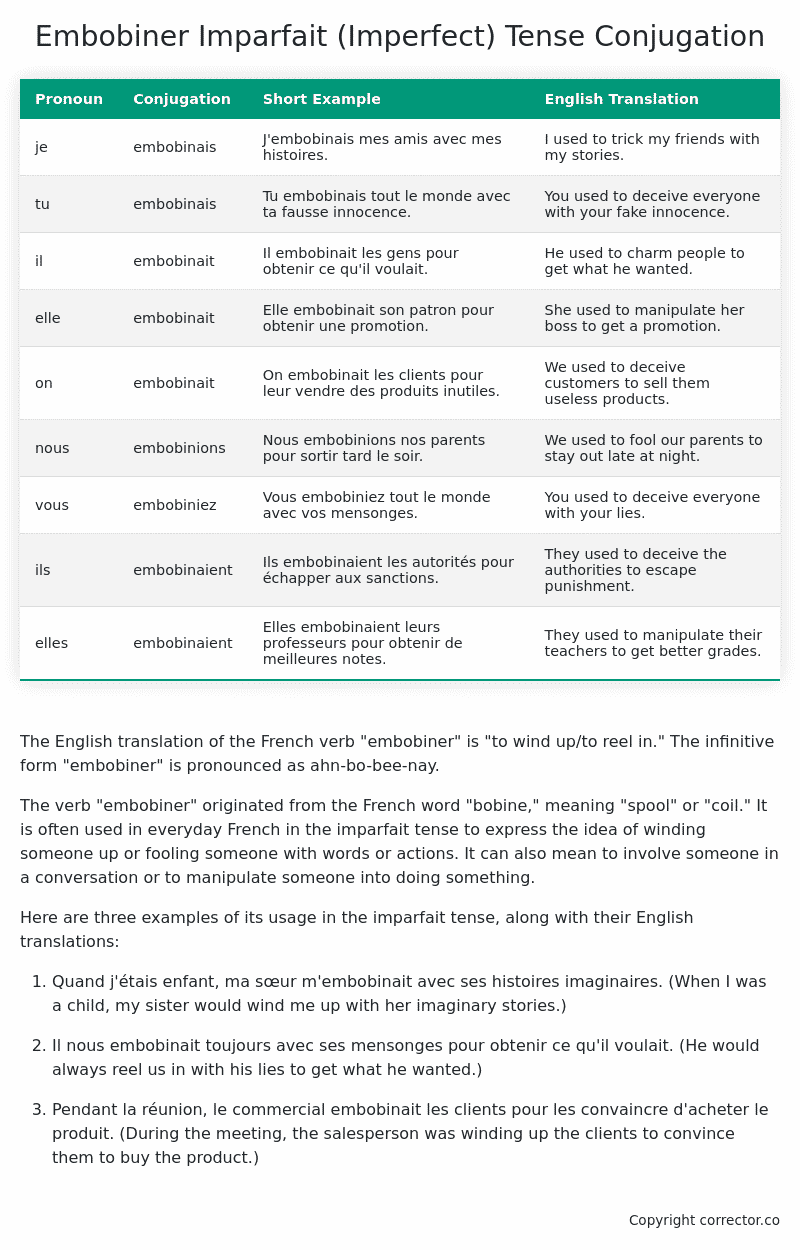Imparfait (Imperfect) Tense Conjugation of the French Verb embobiner
Introduction to the verb embobiner
The English translation of the French verb “embobiner” is “to wind up/to reel in.” The infinitive form “embobiner” is pronounced as ahn-bo-bee-nay.
The verb “embobiner” originated from the French word “bobine,” meaning “spool” or “coil.” It is often used in everyday French in the imparfait tense to express the idea of winding someone up or fooling someone with words or actions. It can also mean to involve someone in a conversation or to manipulate someone into doing something.
Here are three examples of its usage in the imparfait tense, along with their English translations:
-
Quand j’étais enfant, ma sœur m’embobinait avec ses histoires imaginaires.
(When I was a child, my sister would wind me up with her imaginary stories.) -
Il nous embobinait toujours avec ses mensonges pour obtenir ce qu’il voulait.
(He would always reel us in with his lies to get what he wanted.) -
Pendant la réunion, le commercial embobinait les clients pour les convaincre d’acheter le produit.
(During the meeting, the salesperson was winding up the clients to convince them to buy the product.)
Table of the Imparfait (Imperfect) Tense Conjugation of embobiner
| Pronoun | Conjugation | Short Example | English Translation |
|---|---|---|---|
| je | embobinais | J’embobinais mes amis avec mes histoires. | I used to trick my friends with my stories. |
| tu | embobinais | Tu embobinais tout le monde avec ta fausse innocence. | You used to deceive everyone with your fake innocence. |
| il | embobinait | Il embobinait les gens pour obtenir ce qu’il voulait. | He used to charm people to get what he wanted. |
| elle | embobinait | Elle embobinait son patron pour obtenir une promotion. | She used to manipulate her boss to get a promotion. |
| on | embobinait | On embobinait les clients pour leur vendre des produits inutiles. | We used to deceive customers to sell them useless products. |
| nous | embobinions | Nous embobinions nos parents pour sortir tard le soir. | We used to fool our parents to stay out late at night. |
| vous | embobiniez | Vous embobiniez tout le monde avec vos mensonges. | You used to deceive everyone with your lies. |
| ils | embobinaient | Ils embobinaient les autorités pour échapper aux sanctions. | They used to deceive the authorities to escape punishment. |
| elles | embobinaient | Elles embobinaient leurs professeurs pour obtenir de meilleures notes. | They used to manipulate their teachers to get better grades. |
Other Conjugations for Embobiner.
Le Present (Present Tense) Conjugation of the French Verb embobiner
Imparfait (Imperfect) Tense Conjugation of the French Verb embobiner (You’re reading it right now!)
Passé Simple (Simple Past) Tense Conjugation of the French Verb embobiner
Passé Composé (Present Perfect) Tense Conjugation of the French Verb embobiner
Futur Simple (Simple Future) Tense Conjugation of the French Verb embobiner
Futur Proche (Near Future) Tense Conjugation of the French Verb embobiner
Plus-que-parfait (Pluperfect) Tense Conjugation of the French Verb embobiner
Passé Antérieur (Past Anterior) Tense Conjugation of the French Verb embobiner
Futur Antérieur (Future Anterior) Tense Conjugation of the French Verb embobiner
Subjonctif Présent (Subjunctive Present) Tense Conjugation of the French Verb embobiner
Subjonctif Passé (Subjunctive Past) Tense Conjugation of the French Verb embobiner
Subjonctif Imparfait (Subjunctive Imperfect) Tense Conjugation of the French Verb embobiner
Subjonctif Plus-que-parfait (Subjunctive Pluperfect) Tense Conjugation of the French Verb embobiner
Conditionnel Présent (Conditional Present) Tense Conjugation of the French Verb embobiner
Conditionnel Passé (Conditional Past) Tense Conjugation of the French Verb embobiner
Conditionnel Passé II (Conditional Past II) Tense Conjugation of the French Verb embobiner
L’impératif Présent (Imperative Present) Tense Conjugation of the French Verb embobiner
L’impératif Passé (Imperative Past) Tense Conjugation of the French Verb embobiner
L’infinitif Présent (Infinitive Present) Tense Conjugation of the French Verb embobiner
L’infinitif Passé (Infinitive Past) Tense Conjugation of the French Verb embobiner
Le Participe Présent (Present Participle) Tense Conjugation of the French Verb embobiner
Le Participe Passé (Past Participle) Tense Conjugation of the French Verb embobiner
Struggling with French verbs or the language in general? Why not use our free French Grammar Checker – no registration required!
Get a FREE Download Study Sheet of this Conjugation 🔥
Simply right click the image below, click “save image” and get your free reference for the embobiner imparfait tense conjugation!

Embobiner – About the French Imparfait Tense
NOTE: To take a deep dive into all the French tenses then see our article on Mastering French Tense Conjugation.
Formation of the Imparfait Tense
For regular -er verbs:
For regular -ir verbs
For regular -re verbs
Common Everyday Usage Patterns
Description of Past Habits
Background Information
Mental and Emotional States
It’s employed to express emotions, thoughts, or physical sensations in the past. For example: “J’étais content quand il est arrivé.” (I was happy when he arrived.)
Ongoing Actions
Points to Note About the Imparfait Tense
Passé Composé vs. Imparfait
Conditional
Si Clauses
Narration
I hope you enjoyed this article on the verb embobiner. Still in a learning mood? Check out another TOTALLY random French verb imparfait conjugation!


